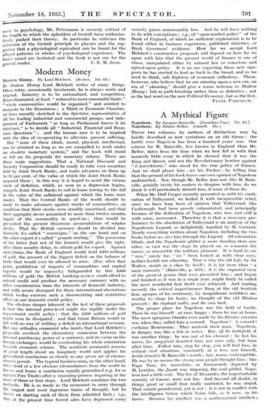Modern Money
Modern Money. By Lord Melchett. (Seeker. 10s. (id.)
Is Modern Money Lord Melchett writes of many things. Often witty, occasionally incoherent, he is always acute and original. Industry is to be rationalized, and competition, if not eliminated, at least "reduced to more reasonable limits" "whole communities would be organized?' and assisted to emigrate to the Dominions ; a Third or Economic Chamber, on lines recently sketched in the Spectator, representative of all the leading industrial and commercial groups, and inde- pendent of Parliament "as long as Parliament leaves it its existence," is to decide all "Industrial, Financial and Econ- omic Questions " ; and the human race is to be inspired with the idea of co-operating to alleviate present suffering.
But "none of these ideals, moral, physical, intellectual, can be attained as long as we are compelled to work under an obsolete monetary -system," and the book will stand or fall on its proposals for monetary reform. There are three main suggestions. That a National Discount and Security Corporation should be ready to take over securities held by Joint Stock Banks, and make advances on them up to 70 per cent, of the value at which the Joint Stock Banks acquired them'; in this way it is hoped to avert the vicious circle of deflation, which, as soon as a depression begins, compels Joint Stock Banks to call in loans (owing to the fall in the value of the collateral against which the loans were made). That the Central Banks of the world should be ready to make advances against stocks of commodities, on condition that their stocks were steadily amortized, and that their aggregate never amounted to more than twelve months supply of the commodity in question ; thus would be prevented the present disastrous accumulations of surplus stocks. That the British currency should be divided into domestic L's called "sovereigns," on the one hand and on the other export S's called "pounds sterling." The possession of the latter (but not of the former) would give the right, after three months delay, to obtain gold for export. Against such claims, the Bank of England would hold £300 millions of gold, the amount of the biggest deficit on the balance of trade that would ever be allowed to arise. (For, after that point, prohibition of imports of commodities and capital exports would be imposed.) Safeguarded by this £300 millions of gold, the British banking-system could afford to extend credit and produce the necessary currency with no other consideration than the interests of domestic industry, and with secure disregard for those international aberrations Which to-day exercise such a disconcerting and restrictive effect on our domestic credit policy.
The obvious danger inherent in the last of these proposals is that the internal price-level might rise rapidly under the expansionist credit policy ; that the 1300 millions of gold Might soon be dissipated ; and that Great Britain would be left with no way of settling a deficit on international account. But any orthodox economist who insists that Lord Melehett's Proposals overlook the elementary connexion between the internal purchasing power of a currency, and its value on the foreign exchanges, would be overlooking his whole orientation towards economic science. The academic economist reasons at great length about an imaginary world and applies his generalized conclusions as closely as any given set of circum- stances permit. The typical business-man, on the other hand, takes hold of a few obvious circumstances from the world he knows and fol:ma a conclusion equally generalized (e.g. for or against Free Trade) after a reasoning-process requiring at the most of three or four steps. Lord Melchett combines the two methods. He is as ready as the economist to carry through the longest and most ingenious trains of thought, but he irlsistS on starting each of them from admitted facts; e.g., that at the present time forced sales have depressed many
. .
security prices unreasonably low. And he will have nothing to do with conceptions ; e.g., of "open-market policy" of the Bank of England, of which no sufficient explanation is to be found either in business experience, published statistics, or Bank Governors' evidence. How far we accept Lord Melehett's constructive proposals will depend on how far we agree with him that the present world of finance is one of chaos, unregulated either by natural law or conscious and agreed-upon policy. It is no use expecting these new sign- posts he has erected to lead us back to the broad, and as we used to think, safe highway of economic orthodoxy. Those, however, who believe that we are entering upon a new era, an era of "planning," should give a warm welcome to Modern Money ; but as path-breaking rather than as definitive ; not as the last word on the new Political Economy, but as the first.
FRANK PAKENHAM.
































































 Previous page
Previous page